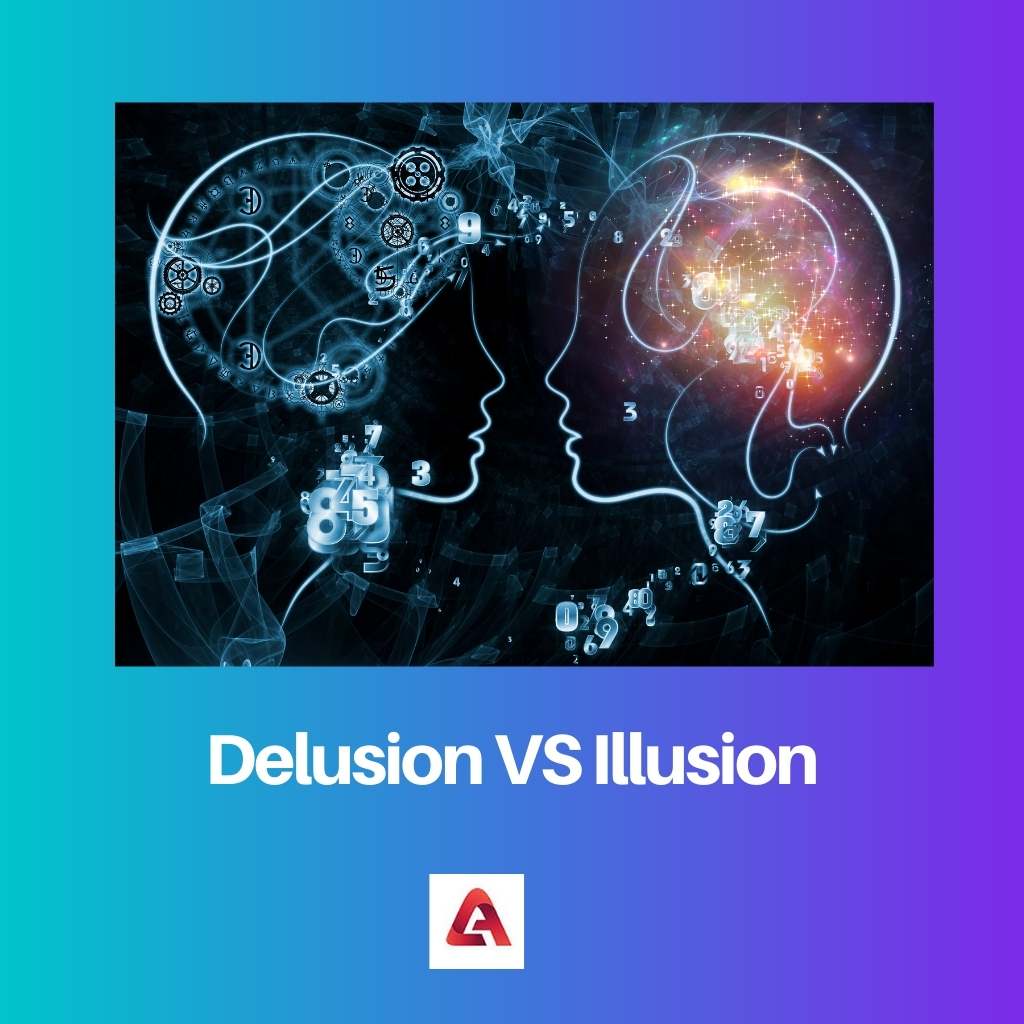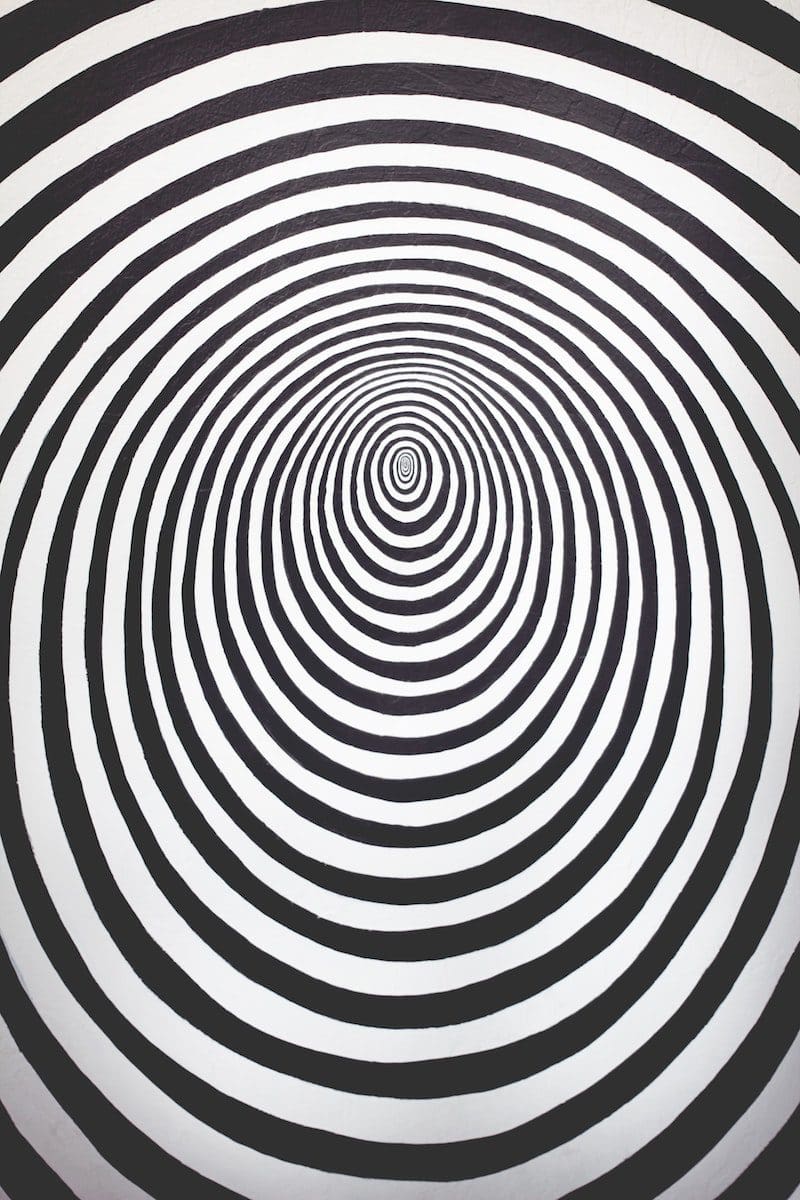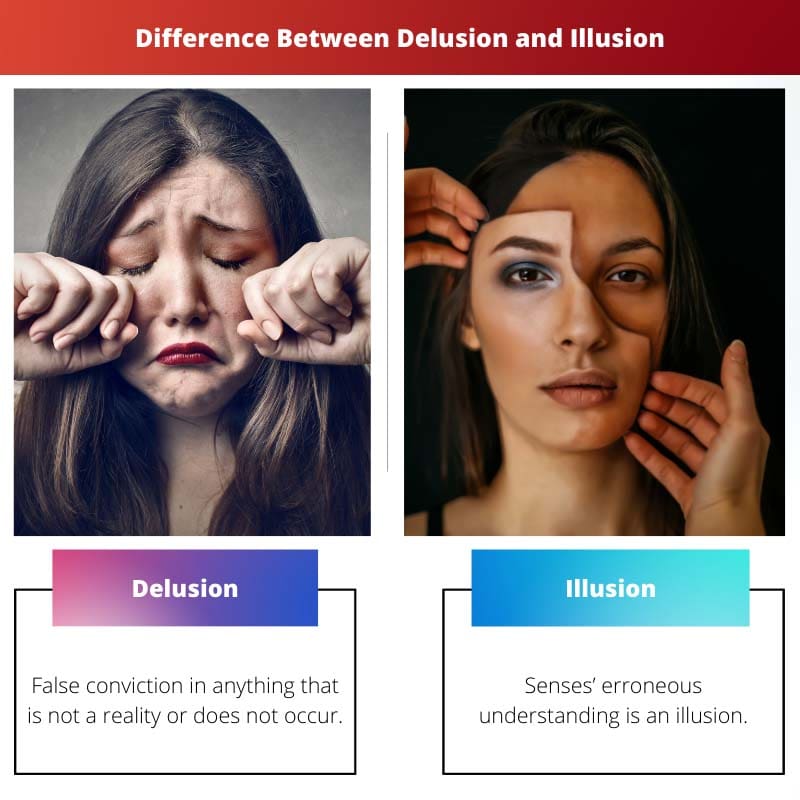While illusion refers to unreal perception, delusion refers to a misguided idea. Illusion is created and controlled by external influences, whereas an individual’s own emotions create delusion.
The illusion occurs when your perception dupes you, but delusion occurs when you make a nuisance of yourself due to your thoughts.
Key Takeaways
- Delusion is a false belief that is not based on reality and is a symptom of a mental disorder, while illusion is a perception that is not in line with reality but is created by the mind.
- Delusions are fixed and resistant to change, while illusions are temporary and can be dispelled with further examination.
- Delusions are associated with mental illness, while illusions are a natural part of human perception and can be experienced by anyone.
Delusion vs Illusion
Delusion is a false judgment or belief about external reality despite there being irrefutable evidence to the contrary, and it occurs in mental conditions. Illusion is the misinterpreted perception of a sensory experience or a deceptive impression or appearance. It is also a false belief or idea.

Delusions are characterized as persistent, incorrect perceptions that contradict truth. Regardless of contradictory facts, a deluded individual cannot let go of their beliefs.
Misunderstanding of circumstances frequently reinforces delusions. Many delusions are accompanied by anxiety.
For instance, notwithstanding the proof of the opposite, somebody might claim that the administration is monitoring our every movement through electromagnetic radiation.
Illusion is defined as anything that appears to be different from what it is, anything that is untrue or not genuine yet appears to be genuine or actual.
An illusion is a sensory aberration that reveals how the individual brain regularly organizes and perceives perceptual stimuli. Illusions arise when a scenario alters a person’s ability to perceive dimension, movement, and perceptive consistency.
Comparison Table
| Parameters of Comparison | Delusion | Illusion |
|---|---|---|
| Definition | False conviction in anything that is not a reality or does not occur, | Senses’ erroneous understanding is an illusion. |
| Situation | When a human is in an unstable state, this occurs. | Even in a healthy frame of consciousness, this occurs. |
| Experience | Experience cannot be the same and varies from person to person. | The experience may be the same. |
| Treatment | Therapy from a psychologist is necessary. | The individual self-corrected. |
| Stimulus | The stimulus that doesn’t prevail. | External as well as explicit. |
What is Delusion?
Delusion is defined as a deeply maintained opinion that is supported by proof indicating the perception is wrong. A neurological condition or a psychological disorder frequently causes delusions.
Nevertheless, delusion is unrelated to any specific illness and has been observed as a symptom of various medical and mental diseases.
Delusion is a common clinical symptom of psychotic diseases such as psychosis, mood disorders, as well as paraphrenia. A weird delusion is an unusual and absurd view, such as an individual claiming invaders have stolen a portion of the brain.
A non-bizarre illusion would be one that may happen, such as the individual being drugged or being watched.
To be labeled as delusional, a human’s thinking cannot be caused by the use of narcotics or a generic prescription, and the individual must be devoid of any history of mental health issues.
If you exhibit signs of delusional disorder, your physician will most likely conduct a thorough health background and physical examination.
While there are no laboratory tests to identify delusional disorders precisely, the doctor may employ diagnostic procedures to rule out chronic conditions as the origin of the complaints, such as imaging investigations or blood testing.
Suppose the doctor cannot identify a medical cause for the symptoms. In that case, he or she may send the patient to a mental health specialist qualified to evaluate and cure mental diseases.
They will utilize interview and evaluation procedures to determine if the individual has a psychotic condition.

What is Illusion?
Illusion is a view that happens when sensory stimulation is there but is improperly interpreted and misconstrued, such as listening to the breeze and misinterpreting it as someone sobbing.
Everyone might have an illusion from time to time. On the other hand, illusions are quite prevalent in patients diagnosed with schizophrenia. Illusions reveal important data about how the brain interprets knowledge.
They can be problematic for empirical studies since they highlight how even observational evidence can be deceptive. Optical illusions may fool the majority of people, and researchers can use these optical phenomena to help understand perceptions and brain structure.
Illusions can be caused by certain brain disorders. People suffering from migraine, for instance, commonly describe seeing halos, which comprise of motion or colors at the outside margins of a person’s vision.
They can arise from a variety of causes, including the influence of light on an item, a lack of perceptual data about an item, or flaws in an individual’s visual integration.
Colors and apparitions, both of which are reliant on the atmosphere, can be caused through reflection and refraction.
Pseudohallucinations are illusions that might indicate a psychological disorder. Pseudohallucinations can occur when a person is anxious or fearful or when he or she transfers their emotions onto other things or persons.
For instance, people under intense psychiatric treatment have been reported to regard others as beasts or demons.

Main Differences Between Delusion and Illusion
- Illusion can refer to a certain view that is not real or does not occur in reality, whereas a delusion can be defined as an erroneous presumption.
- An illusion is one that deceives the mind, but a delusion is something that one believes to be true even after others refute it with proper evidence.
- Illusion can relate to the intellect, whereas delusion can refer to faith.
- Illusion is a type of perceptive major disruption, whereas delusion is a type of major cognitive disruption.
- Illusion is induced by external social influences, whereas delusion is generated by one’s own thoughts and emotions.

- https://www.emerald.com/insight/content/doi/10.1108/09513540710716795/full/html?fullSc=1&fullSc=1&fullSc=1&fullSc=1
- https://www.tandfonline.com/doi/abs/10.1080/14616689908721321

This article explained this topic brilliantly, thank you.
Very informative, it’s fascinating how the mind works. I am fascinated by the differences between illusion and delusion. It is a very interesting part of human perception and cognition. I would love to read more articles of this kind.
Yes, the comparison of illusions and delusions was very enlightening and the article really helped me understand the differences between the two.
I found this article to be very insightful. It has really broadened my knowledge on the topic of illusion and delusion.
I completely agree with this post. It is an accurate analysis of the themes of illusion and delusion that fully captures their essence.
Absolutely, the definition and explanation of the differences between illusion and delusion provided in this article is exceptional.
Not a fan of the content; I found it too technical and long winded.
The article was presented in an engaging and intelligent manner. It managed to explain complex ideas in a clear and concise manner.
I completely agree. The authors really succeeded in making such complex concepts accessible to a wider audience.
The comparison table was quite useful in summarizing the contrasts between delusion and illusion. It really helped in understanding the two concepts.